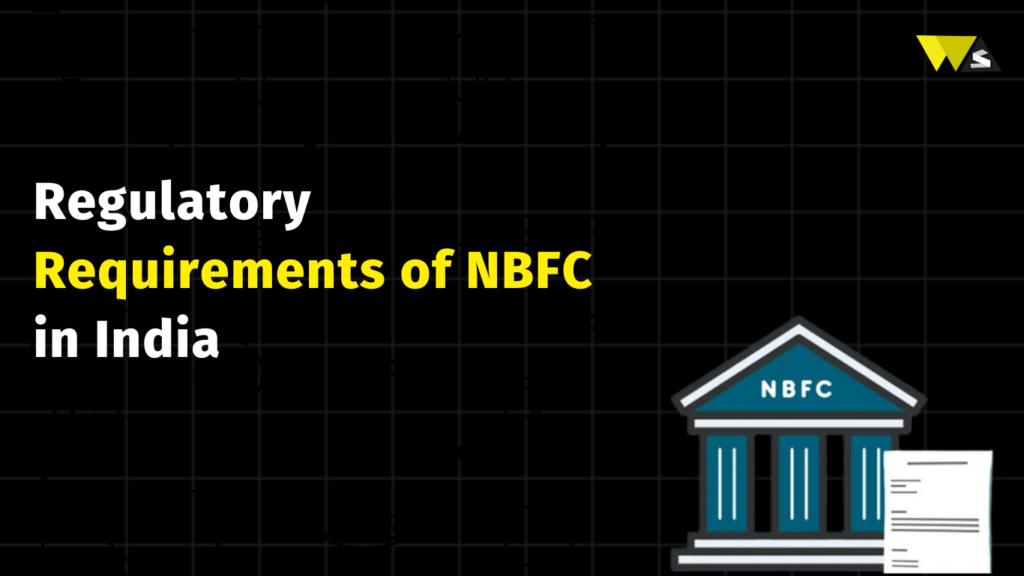A non-banking financial company (NBFC) is a financial institution. Under the Companies Act (2013), this kind of company is mostly involved in accepting loans and advances; purchasing stocks or shares; leasing; chit business etc. We’ll discuss about the Regulatory Requirements of NBFC in India in this article.
In India, NBFC registration is regulated by the Reserve Bank of India. Because of the RBI Rule, the parties who are affected have the access to a variety of banking & non-banking services. They are nevertheless constrained by the rules that are made by the RBI even if they are lacking a banking license.
As per the directions mentioned under Chapter III B of the RBI Act of 1934, the RBI supervises & controls the activities of non-banking financial companies. The rules and regulations must be adhered to in order to register the NBFC.
The main business activity of NBFCs is to raise capital from investors and public depositors. After that, they lend money to borrowers in compliance with Reserve Bank of India regulations. NBFCs are starting to take the place of the banking and finance sector. A minimum net owned fund of Rs. 10 crore is required by NBFC (before it was Rs. 2 crore). The NOF will remain at 2 crores for NBFC-P2P, NBFC-AA, and NBFCs without public financing or client interface.
Importance of Regulatory Requirements: NBFC in India
- The Reserve Bank of India’s rules and regulations are mostly known to be the NBFC compliance. These rules are in place to protect people’s interests by guaranteeing the stability and efficient operation of the financial system.
- It is the major part of the Indian financial system, that offers services to people and corporations without access to conventional banking systems.
- However, NBFC it itself has number of rules and regulations, the most important of which are related to classification of assets, provisioning, and capital adequacy.
- However, there may be severe fines and penalties for breaking RBI laws. These fines have the potential to be significant and negatively affect the finances of your company. You may protect your company’s finances and steer clear of these fines by adhering to the requirements.
- NBFCs give people credit and deal mostly with sensitive financial data. In order to meet this, compliance with rules and protection of consumer data against fraud and misuse are required.
- Additionally, NBFC compliance builds trust across stakeholders, including customers, regulators, and investors. It also shows that the NBFC is prepared to accept accountability for its acts and is dedicated to moral and open business practices.
- Even NBFC states’ compliance with RBI. The financial system’s stability is aided by RBI compliance. To ensure they have enough funds to pay the debts, NBFCs needs to maintain a specific capital adequacy.
- Preventing any upcoming risks that have the ability to collapse the financial system is very important.
NBFC in India: Important Regulatory Requirements
- Registration and Certification: Making sure you have been registered with the Reserve Bank of India is the first step towards compliance. The apex institution (RBI) states that a certificate of Registration (CoR) is necessary for it. According to the NBFC compliance procedure, keeping a minimum net owned fund (NOF), maintaining reporting, and meeting prudential standards are all part of the process.
- Data Security: One essential element of NBFC Compliance is data security. It guarantees that the client data is completely safe and secure. This brings up a bill called the Personal Data Protection Bill of 2019, which outlines the integrated security measures to prevent data breaches or improper treatment.
- Sufficient Capital: When it comes to NBFC compliance, sufficient capital serves as a guarantee provided by the company to bear up to 15% of any losses or financial shocks. This is the lowest ratio that the rule applies to. Failing to do so may result in consequences like license revocation.
- AML and KYC: Anti-money laundering and know your customer policies are components of NBFC compliance. You must identify the clients inside this, search for accurate records, and report any questionable conduct. If you don’t follow you will face harsh fines.
Required Documents for Registration as Type I- NBFC ND
- In case of public limited company, certified copies of Certificate of Incorporation (COI) and Certificate of Commencement of Business.
- Certified copies of a portion of the MOA that exclusively addresses the financial business’s primary objective clause.
A certified and accurate copy of the board resolution declaring that:
- Prior to receiving registration from RBI, the firm is not engaging in any NBFC activity, has ceased doing so, and will not resume doing so.
- The UIBs in the group in which the director has a significant stake or in any other case have never accepted a public deposit, are not holding one as of this date, and will never accept one in the future.
- The RBI Guidelines were followed in creating the “Fair Practices Code” by the company.
- The Reserve Bank of India’s clearance is required for the corporation to take public funds going forward, as it has not done so in the past and does not now own any.
- Without the Reserve Bank of India’s clearance, the company does not now have a consumer interface and will not have one in the future.
- A copy of the banker’s certificate of no lien and the fixed deposit receipt, both of which show the amounts supporting the net owned fund.
- Audited financial statements and the reports of the directors and auditors from the business’s date of incorporation, or for the previous three years, if the firm is already established, whichever is less.
- Regarding the applicant company, its group, subsidiary, associate, holding company, associated parties, and directors with a material stake in other businesses, a banker’s report is provided. The interactions between these entities and the bankers as a depositing or borrowing entity should be covered in the banker’s report.
Required Documents for Registration as Type II- NBFC ND
- In case of public limited company, certified copies of certificate of Incorporation (COI) and Certificate of Commencement of Business.
- Certified copies of a portion of the MOA that exclusively addresses the financial business’s primary objective clause.
A copy of the board resolution certified as true, which states:
- The company has not been engaging on any NBFC activity/stopped NBFC operation and is unlikely to keep on/commence the same before acquiring NBFC registration from RBI.
- The company does not now hold any public deposits, has not accepted any in the past (provide specific time), and will not accept any in the future without the Reserve Bank of India’s prior clearance.
- As of this date, none of the UIBs in the group in which the director has a material interest or has previously declined a public deposit have any public deposits and will not accept any in the future.
- In accordance with RBI Guidelines, the company has created a “Fair Practices Code”.
- A copy of the banker’s certificate of no lien and the fixed deposit receipt, both of which show the balances supporting the net owned fund
- For established businesses, the last three years of operation, or the whole duration of the company’s existence, should be submitted, along with the audited balance sheet, profit and loss account, and directors’ and auditors’ report.
- A duplicate of the highest level of educational and professional qualification certificate for each director.
- A copy of each director’s experience certificate, if applicable, in the banking or financial services industries.
- Regarding the applicant company, its group, subsidiary, associate, holding company, associated parties, and directors with a significant stake in other businesses, a banker’s report is provided. The interactions between these entities and the bankers as a depositing or borrowing entity should be covered in the banker’s report.
Procedure of NBFC Registration in India
- Get Din % DSC for the directors.
- Application for File Name Approval
- A directors’ affidavit to satisfy RBI compliance
- Drafts of the AOA and MOA
- Include the required documents with the incorporation forms.
- Obtain the certificate of registration from the Registrar of Companies.
- Transfer net owned funds to the company’s newly formed bank account.
- Register with the RBI in accordance with the RBI Act 1934.
- The applicant company must use the RBI’s official website to submit an online application.
- An applicant will then receive a reference number to help with future inquiries.
- Submit the duplicate hard copies to the RBI regional office in question after that.
- Every document that is submitted will have its accuracy verified by the regional office.
- The central office will receive the NBFC licensing application from the regional office.
- The RBI central office only authorizes NBFC registration in India when the requesting company satisfies the standards outlined in section 45-IA.
- The NBFC must to start operating within six months of the Certificate of Registration date.
Conclusion
A vital first step in growing your company and accomplishing new success levels is obtaining NBFC registration with compliance. The regulatory requirements set by the RBI ensure that NBFCs operate in a stable, transparent, and accountable manner.










